27 Mar 2025
BlogOverview
Value engineering in construction represents a systematic approach designed to enhance project value by meticulously analyzing functions and pinpointing cost-saving opportunities, all while ensuring that quality remains uncompromised. This article underscores its critical importance by delving into historical context, showcasing real-world applications, and presenting compelling statistical evidence. It emphasises that effective value engineering can result in substantial cost reductions and improved project outcomes, particularly within the hospitality sector.
Why is value engineering crucial? It addresses the pressing need for efficiency in construction projects. By systematically evaluating functions, professionals can identify areas where costs can be reduced without sacrificing the integrity of the project. This not only leads to financial benefits but also enhances overall project performance.
The implications of value engineering extend beyond mere cost savings. Case studies illustrate its transformative impact on projects, demonstrating how strategic application can lead to innovative solutions and optimised resource allocation. The statistical evidence presented further reinforces the argument that organisations embracing value engineering are better positioned to thrive in a competitive market.
In conclusion, the strategic implementation of value engineering is not just a cost-cutting measure; it is a vital component of successful project management in the construction industry. By prioritising this approach, stakeholders can achieve remarkable outcomes that resonate throughout the hospitality sector and beyond.
Introduction
In the ever-evolving landscape of construction, value engineering (VE) emerges as a pivotal methodology that enhances project value while ensuring cost-effectiveness without compromising quality. How did this transformative approach come to be?
Originating in the 1940s at General Electric, VE has fundamentally altered the management of construction projects, especially as the industry grapples with increasing pressures to optimise resources amid rising material costs. As stakeholders search for innovative solutions to navigate these challenges, grasping the principles and applications of value engineering becomes essential.
The potential for substantial cost savings and improved project outcomes underscores the relevance of VE in today’s construction sector. Thus, for professionals aiming to deliver high-quality, sustainable results, mastering this critical tool is indispensable.
Defining Value Engineering: An Essential Concept in Construction
Value engineering (VE) represents a systematic and structured approach designed to enhance the value of building initiatives through a meticulous examination of their functions and the identification of cost-saving opportunities, all without compromising quality. Originating in the 1940s at General Electric, this method emphasises the delivery of essential functions at the lowest life cycle cost, ensuring that initiatives align seamlessly with both performance and budgetary constraints. In the construction sector, where the equilibrium between cost management and quality assurance is paramount, the role of value engineering is indispensable.
As we look ahead to 2025, the importance of value engineering in management is undeniable. It serves as a strategic tool that not only optimises resources but also fosters innovation in delivery. By focusing on the essential functions of an initiative, stakeholders can pinpoint areas ripe for improvement, ultimately leading to enhanced efficiency and reduced costs.
Recent statistics reveal that effective cost management can yield savings of up to 30% on project expenses, underscoring its critical role within the industry.
The methodology of value engineering has evolved, now incorporating modern techniques and technologies that facilitate superior decision-making. The initial phase requires a comprehensive understanding of the key factors and decisions that have shaped the design, assessing functionality, associated costs, and the impact of each element. This thorough analysis paves the way for informed adjustments that can significantly enhance outcomes.
Initiatives such as the Crossrail Stepney Green effort exemplify successful applications of value engineering in construction. This project encountered considerable challenges due to the use of low-capacity Boat Skips for excavation, which not only posed safety risks but also threatened to prolong the overall timeline. By implementing the Bull excavation system, the team improved waste removal efficiency, reduced cycle times, and ultimately truncated the excavation programme by 12 weeks.
This case illustrates the tangible benefits of applying cost management principles and emphasises the significance of value engineering in construction for achieving success in various endeavours.
Value analysis is essential for matching results with both cost efficiency and sustainability objectives. As the building sector continues to evolve, the importance of cost management remains vital. It not only addresses the urgent need for cost efficiency but also aligns with sustainability goals, ensuring that projects contribute positively to the environment.
By adopting cost optimisation techniques, building professionals can navigate the complexities of contemporary projects while delivering exceptional outcomes that meet the diverse needs of clients. Edmond Shipway’s commitment to optimising solutions ensures that our clients benefit from tailored approaches that enhance results while maintaining cost-effectiveness and sustainability.
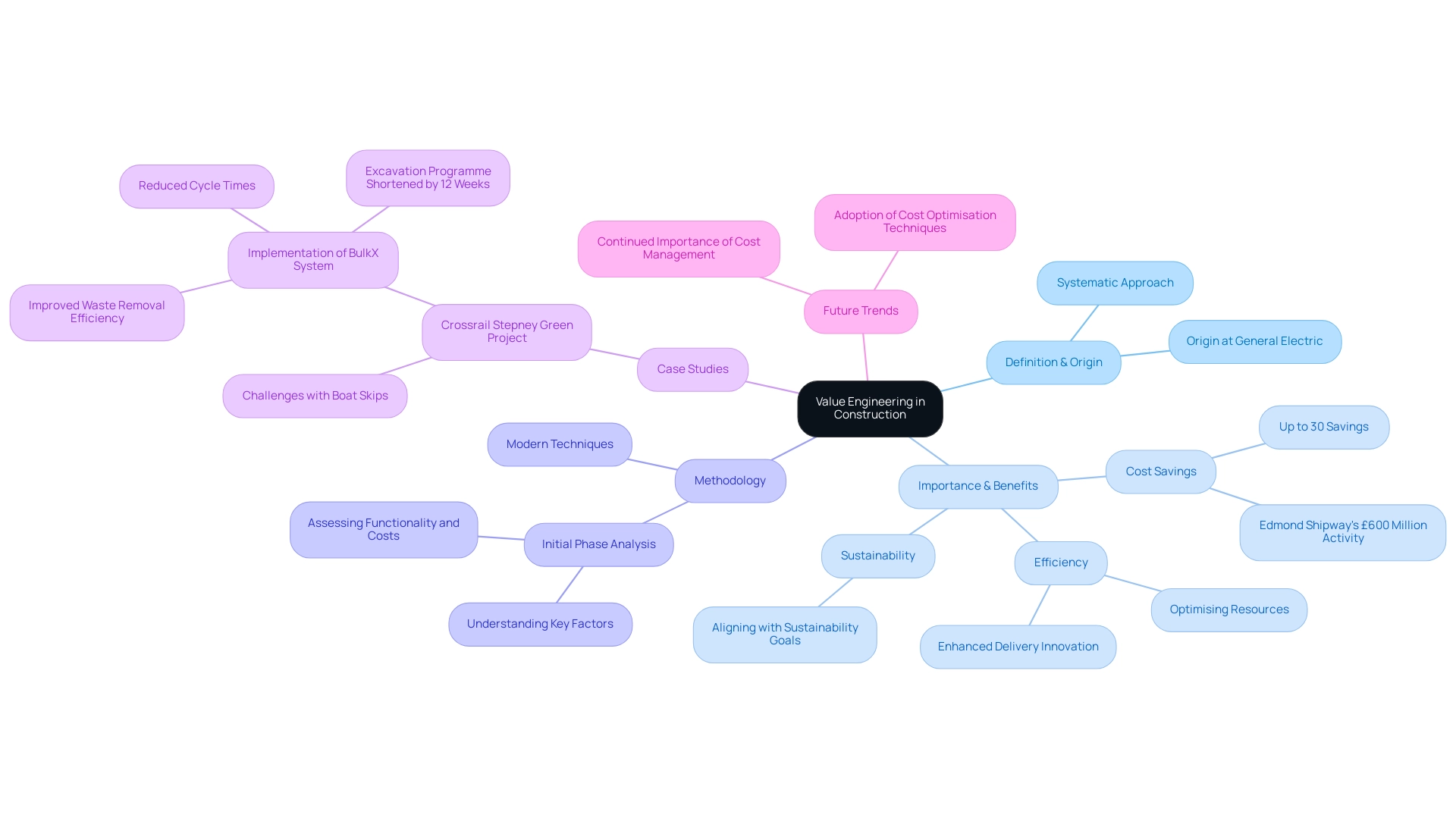
The Benefits of Value Engineering: Enhancing Efficiency and Cost-Effectiveness
Applying value engineering in construction initiatives presents numerous benefits, particularly regarding savings, efficiency, and quality improvement. A thorough analysis of components enables teams to utilise value engineering to identify unnecessary expenditures and explore alternative materials or methods that preserve functionality while reducing costs. For instance, substituting a high-cost material with a more economical yet equally effective option can yield significant financial savings without compromising quality.
In 2025, the emphasis on cost management, particularly through value engineering, has become increasingly critical in the hospitality industry, where budgets are often constrained. Statistics indicate that value engineering can facilitate efficient cost management, resulting in savings of up to 20% in construction projects, making it an essential strategy for developers aiming to optimise their investments.
Moreover, value engineering fosters innovation by encouraging teams to consider creative solutions for achieving project goals more efficiently. A recent case study in the hospitality sector highlighted challenges to implementing cost optimisation, such as limited awareness and skills among practitioners. To address these issues, the study proposed solutions such as integrating cost management courses into technical programmes and organising workshops to educate stakeholders.
These initiatives aim to enhance the application of benefit analysis, ultimately leading to improved outcomes. Expert insights underscore the importance of benefit analysis in attaining cost-effectiveness through value engineering. Industry experts emphasise that the strategic use of value engineering not only reduces expenses but also enhances the overall quality of construction projects.
By employing software applications that assess costs and benefits across financial, social, and environmental dimensions, teams can make informed design choices that align with sustainability goals.
In summary, the benefits of cost analysis via value engineering in construction are substantial, particularly in the hospitality sector. By focusing on cost reductions, fostering innovation, and enhancing quality, value engineering emerges as a vital approach for developers like those working with Edmond Shipway, who navigate the complexities of modern construction.
Key Steps in the Value Engineering Process: A Practical Guide
The process of value engineering in construction represents a systematic approach designed to enhance value while minimising costs. It typically encompasses several key steps:
- Information Gathering: This initial phase involves collecting comprehensive data about the endeavour, including its scope, challenges, and opportunities. Such foundational knowledge is essential for informed decision-making.
- Function Analysis: At this stage, the focus shifts to identifying the essential functions of each component. Understanding what each component contributes to the overall endeavour is crucial for pinpointing areas where benefits can be enhanced or expenses reduced.
- Creative Phase: This step fosters brainstorming of alternative solutions. Engaging diverse perspectives can yield innovative ideas that may not have been initially considered, thus cultivating a culture of creativity and collaboration.
- Evaluation: Here, the feasibility and cost-effectiveness of the proposed alternatives are assessed. This analytical phase is vital for ensuring that any modifications made will genuinely enhance the initiative’s worth without compromising quality or performance. Skills such as analytical thinking and collaboration are essential during this phase to identify improvement opportunities.
- Development: Selected alternatives are refined during this phase. This involves detailed planning and adjustments to ensure that the proposed solutions are practical and align with project goals. The historical context of cost optimisation, which began in the 1940s at General Electric during World War II, underscores its significance. Confronted with material shortages, engineers established a systematic process known as ‘value analysis’ that not only reduced costs but also improved product performance. This historical perspective informs current practices in the Development phase, emphasising the necessity for innovative solutions.
- Presentation: Finally, the proposed changes are communicated to stakeholders. Effective communication is crucial to garner support and ensure that all parties understand the advantages of the optimisation initiatives.
Each of these steps is instrumental in achieving optimal benefits from value engineering in construction projects. Edmond Shipway’s commitment to sustainability and cost-effectiveness is integral to its optimisation strategy.
Best practices in value engineering within construction stress the importance of analytical and critical thinking, effective communication, and collaboration among teams. By adhering to these principles, building professionals can uncover improvement opportunities and generate value-driven solutions that align with contemporary sustainability goals.
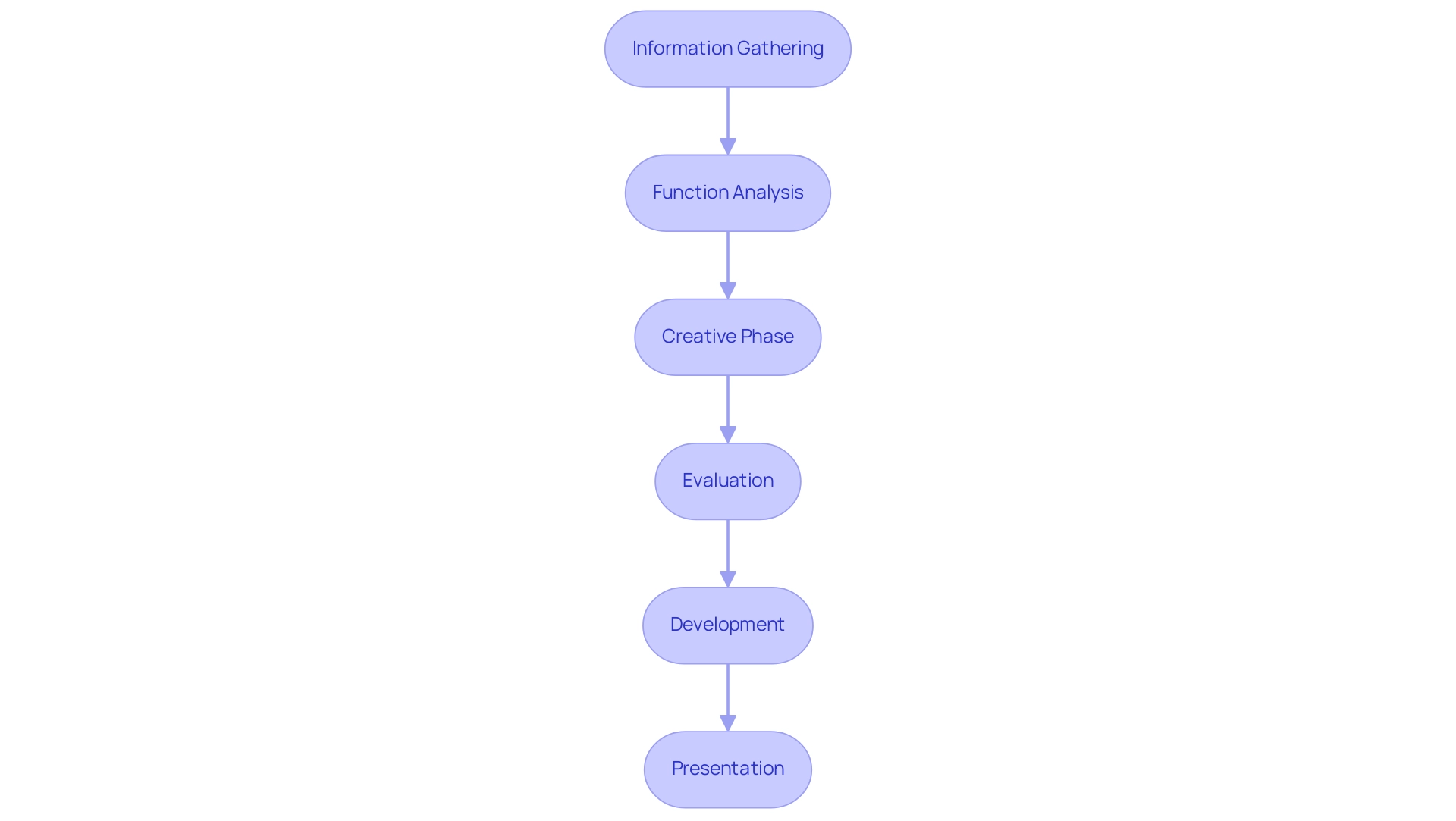
Applying Value Engineering in Construction Projects: Real-World Applications
Value engineering (VE) in construction has emerged as a transformative strategy across various projects, particularly within the hospitality sector, where efficiency and cost-effectiveness are critical. A notable instance is the development of a luxury hotel, where the team, led by Edmond Shipway as Manager and Cost Consultant, leveraged VE to optimise the HVAC system. By assessing alternative designs and materials, they achieved an impressive 15% reduction in installation costs, all while enhancing energy efficiency.
This case exemplifies how VE not only curtails expenses but also aligns with sustainability objectives—a vital consideration in today’s construction landscape.
As we approach 2025, the industry faces ongoing challenges, including rising tariff rates on essential materials such as steel and aluminium, impacting budgets and timelines. In navigating these macroeconomic factors, the implementation of value engineering in construction becomes increasingly crucial. By focusing on innovative solutions, teams can mitigate risks related to material costs and ensure project timelines remain intact.
Recommendations include the establishment of local guidelines for value engineering in construction and the organisation of training sessions with experts. Such initiatives can significantly bolster the understanding and application of value engineering in hotel development. This is especially pertinent given that the UK building sector incurs an estimated loss of £31 billion annually due to rework stemming from outdated or incorrect plans.
The success stories emerging from these initiatives underscore the importance of resource optimisation, yielding not only cost reductions but also improved outcomes. As the industry evolves, a commitment to value engineering in construction will be essential for hospitality developers aiming to deliver high-quality, sustainable projects that meet the demands of modern consumers.
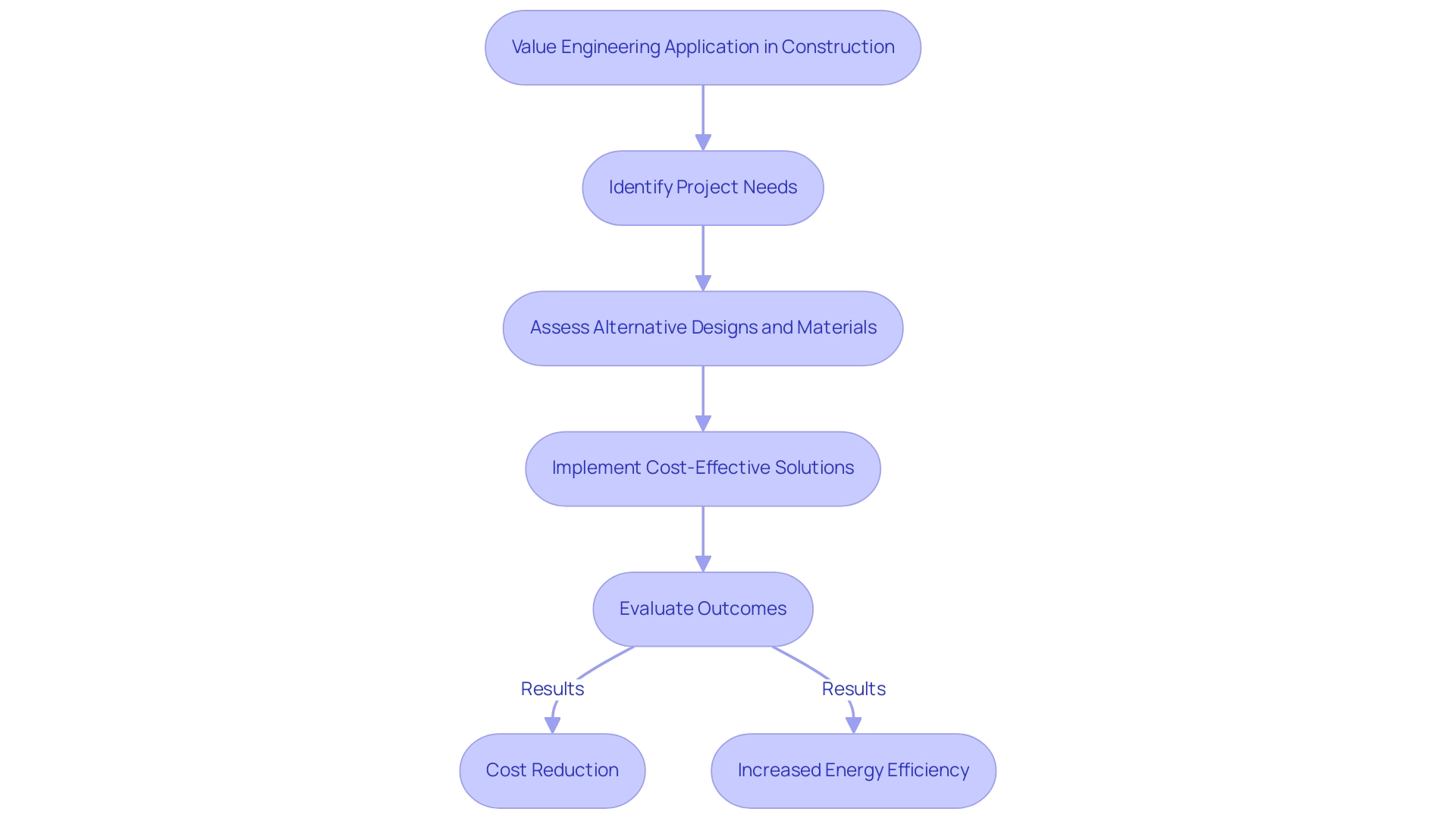
Value Engineering vs. Value Analysis: Understanding the Differences
Cost optimisation and value assessment, though frequently conflated, serve distinct functions within the construction sector. Value engineering in construction, its objective is to optimise costs through value engineering while preserving essential functionality, ensuring that projects are both economically viable and effective in addressing client needs.
In contrast, cost analysis is applied to existing products or processes, concentrating on identifying opportunities for improvement and efficiency enhancements. Recognising these differences is crucial for industry professionals, as it enables them to select the appropriate methodology at each phase. For instance, implementing cost optimisation early in a project can yield substantial savings and improved project efficiency, outlining how the advantages of applying cost optimisation in construction projects and highlights its potential impact on business results.
In 2025, the emphasis on worth analysis has intensified, particularly as firms strive to enhance their current processes and products to adapt to evolving market demands. Statistics indicate that organisations employing cost optimisation techniques can achieve enhanced overall performance, rendering it an essential tool in the competitive construction sector. Furthermore, expert insights underscore the importance of comprehending these methodologies; industry leaders advocate for a strategic approach that integrates value engineering and analysis to maximise success.
By amalgamating these practices, construction professionals can ensure they not only meet but exceed client expectations, ultimately cultivating stronger relationships and driving project success. Additionally, contemporary initiatives such as DISHER’s Value Analysis Workshops highlight the ongoing significance of value engineering in construction for fostering innovation and quality while reducing costs.
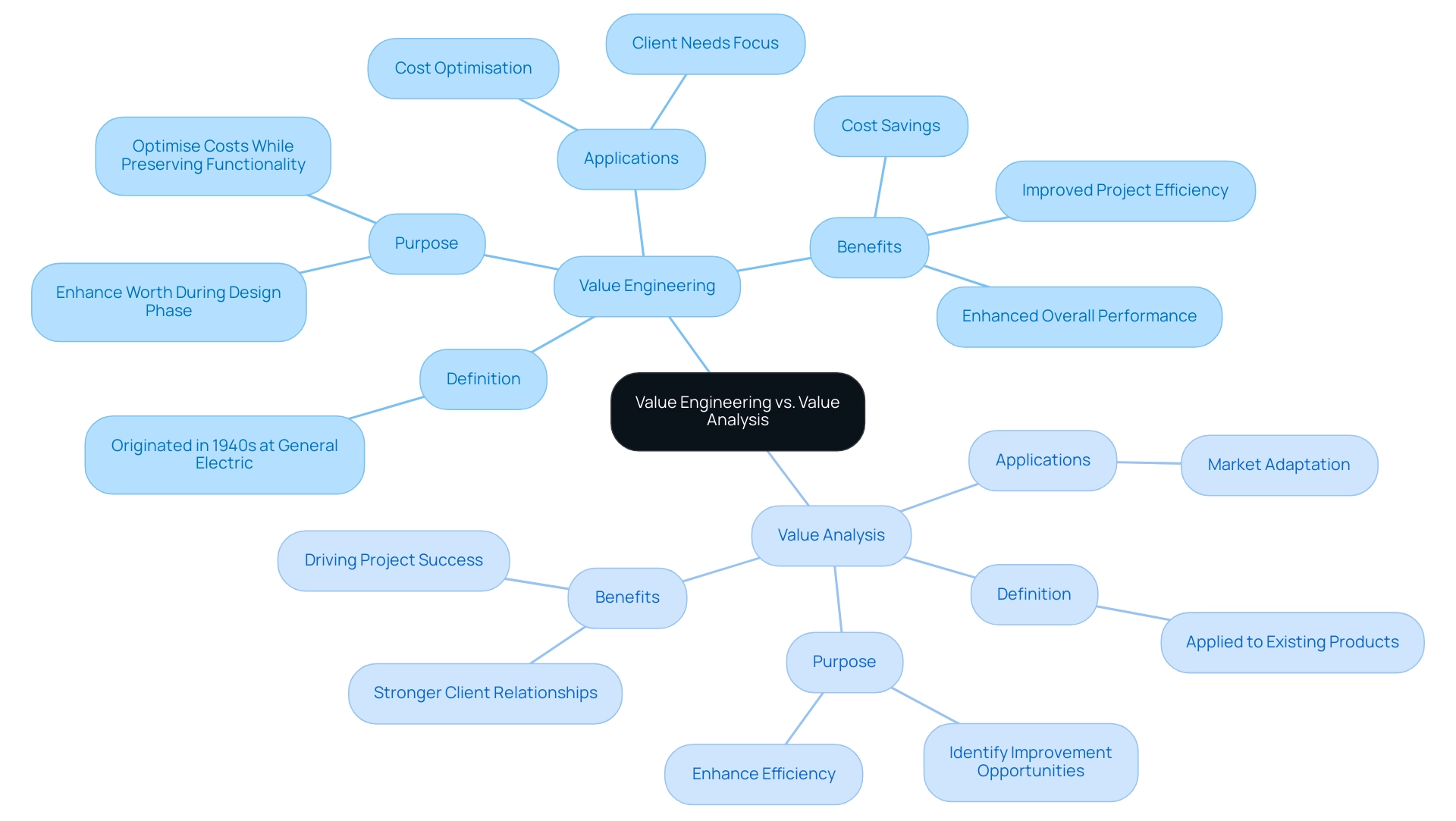
The Evolution of Value Engineering: A Historical Perspective
Value engineering, which emerged in the 1940s at General Electric, was a direct response to the pressing shortages of materials and skilled labour during wartime. Larry Miles, then a vice president at GE, played a crucial role in developing this concept, which aimed to optimise product quality while minimising costs. Quickly gaining traction, this innovative method evolved into a critical practice across various sectors, particularly in building.
As the building sector faced mounting pressures to enhance efficiency and reduce expenditures, the practice of value engineering in construction became a cornerstone methodology. By the 2020s, it was widely recognised as an essential tool for improving outcomes, fostering collaboration among stakeholders, and identifying potential risks. At Edmond Shipway, we emphasise customised consultancy solutions that integrate management, cost efficiency, and sustainability, ensuring our clients, especially in the hospitality sector, can effectively address these challenges.
Our legacy in cost consultancy underpins our approach, enabling us to deliver value-driven solutions that align with our clients’ objectives. The evolution of cost management practices has been characterised by a growing focus on sustainability, aligning with the sector’s shift towards eco-friendly building techniques. Edmond Shipway’s Mechanical and Electrical Consultants specialise in building services that prioritise energy efficiency and reducing CO2 emissions, crucial factors in today’s climate-conscious market.
Statistical insights reveal that in 2024, significant investments were made in infrastructure. This influx of funding underscores the importance of value engineering in construction to maximise the impact of such investments, ensuring projects are completed on time and within budget while adhering to high-quality standards.
However, the construction landscape is also facing challenges due to increased tariff rates on strategic materials like steel and aluminium. These tariffs aim to bolster domestic production but may raise the risks of reciprocal tariffs, potentially impacting project costs and timelines. Here, value engineering in construction can play a pivotal role in navigating these challenges by identifying cost-saving opportunities and optimising resource allocation, essential for hospitality developers striving to maintain profitability.
The historical trajectory of value creation reflects its adaptability to changing industry demands. From its inception, it has incorporated advanced analytical techniques and collaborative strategies, enabling professionals to navigate complex environments effectively. Value optimisation is crucial for organisations to improve their results and align with current market dynamics.
Case studies demonstrate the necessity of a varied skill set in value analysis, emphasising the significance of analytical thinking, communication, and management abilities in recognising improvement opportunities and producing outcome-focused solutions. These skills are essential for effectively applying optimisation techniques and achieving desired results.
In summary, the development of cost optimisation since the 1940s has led to the emergence of value engineering in construction, influenced by historical occurrences and industry requirements. This evolution has resulted in its current status as an essential practice in construction. As the sector continues to evolve, value engineering will remain a key strategy for enhancing project efficiency, reducing costs, and promoting sustainable practices, particularly within the diverse sectors Edmond Shipway serves, including hospitality, healthcare, and finance.
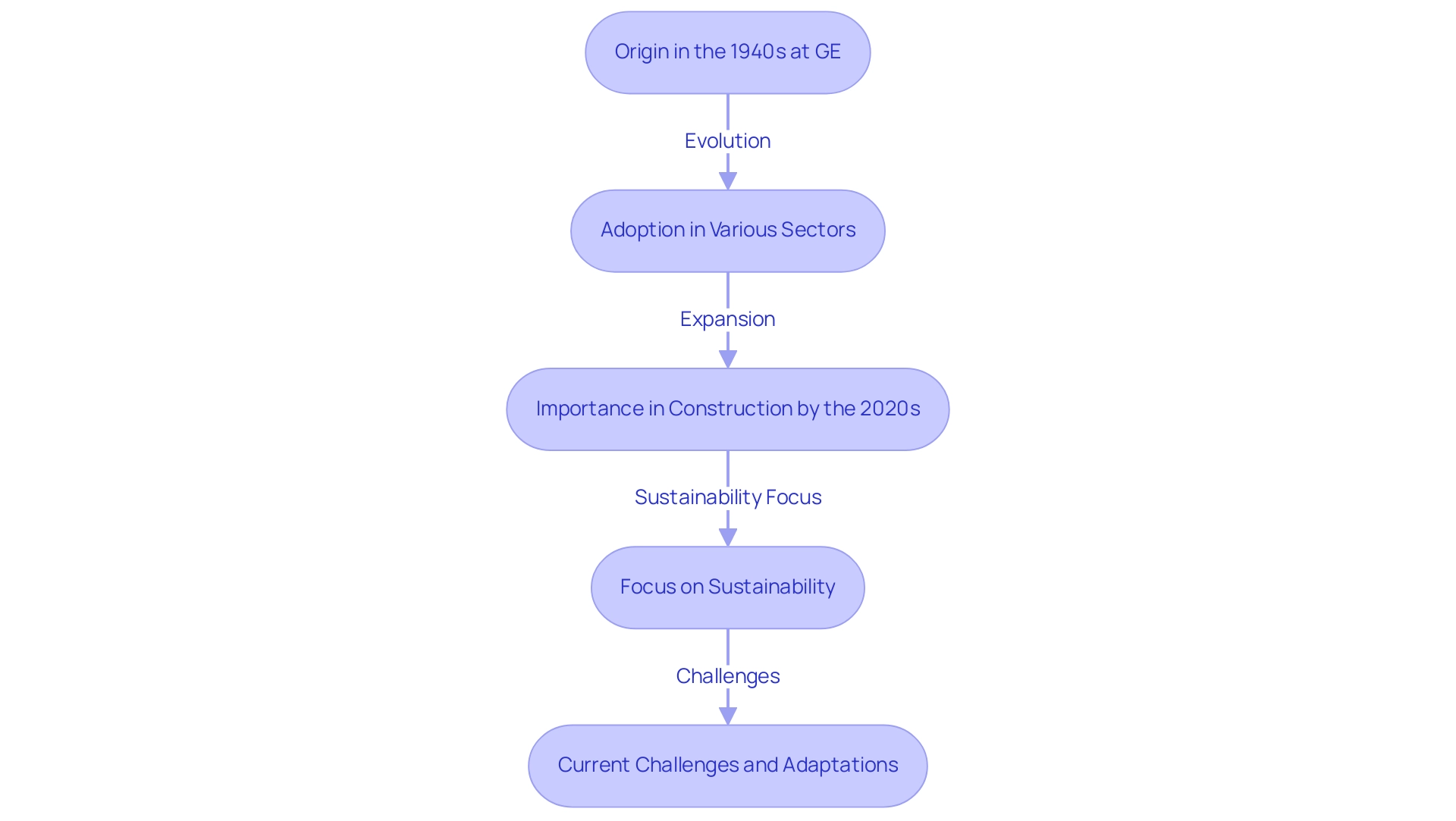
Conclusion
Value engineering stands as a pivotal methodology within the construction industry, driving efficiency, curtailing costs, and elevating project outcomes. By meticulously analysing project functions and pinpointing cost-saving opportunities, stakeholders can fulfill essential objectives at the lowest life cycle cost, all without sacrificing quality. This methodology, which originated in the 1940s at General Electric, has evolved to meet the economic challenges of today.
Real-world applications, particularly within the hospitality sector, vividly illustrate the substantial advantages of value engineering. Successful case studies reveal that strategic adjustments can yield significant financial savings while aligning with sustainability goals. As material costs escalate and budget constraints tighten, embracing value engineering becomes imperative for adeptly navigating these complexities.
Understanding the distinctions between value engineering and value analysis empowers construction professionals to implement the appropriate methodologies at various project stages. By nurturing collaboration and fostering innovation, value engineering actively supports contemporary sustainability initiatives.
In conclusion, value engineering transcends being merely a cost-cutting tool; it emerges as a crucial strategy for amplifying project value while championing environmental responsibility. As the construction landscape continues to evolve, the effective integration of value engineering principles will be essential for attaining excellence in project delivery and ensuring client satisfaction. The future of construction hinges on the successful application of value engineering, guaranteeing that projects are completed on time, within budget, and uphold the highest standards of quality and sustainability.
Share


